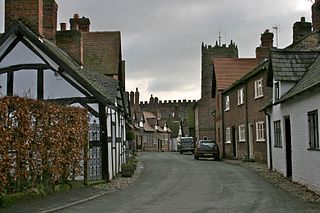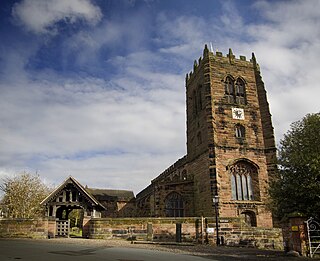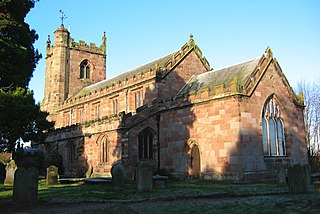
Great Budworth is a village and civil parish in Cheshire, England, four miles (6.4 km) north of Northwich off the A559 road, east of Comberbach, northwest of Higher Marston and southeast of Budworth Heath. Until 1948, Great Budworth was part of the Arley Hall estate.

Little Budworth is a civil parish and village between Winsford and Chester, in the unitary authority of Cheshire West and Chester and the ceremonial county of Cheshire, England. The population of the civil parish taken at the 2011 census was 594. It is primarily known as the location of the Oulton Park motor racing circuit.

In the early 18th century the Oulton Estate was home to the Egerton family and comprised a manor house and a formal garden surrounded by farmland in Cheshire, England. Later in the century the farmland was converted into a park. The estate is now the site of the motor racing track called Oulton Park.

St Peter's Church is in the small hamlet of Aston-by-Sutton, Cheshire near to the town of Runcorn. The church is recorded in the National Heritage List for England as a designated Grade I listed building. It is an active Anglican parish church in the diocese of Chester, the archdeaconry of Chester and the deanery of Great Budworth. It is one of three parish churches in the parish of Aston-by-Sutton, Little Leigh and Lower Whitley. The other two being St Michael and All Angels, Little Leigh and St Luke, Lower Whitley. The three were previously individual parishes united in a benefice along with St Mark, Antrobus. The listing describes it as "a most pleasing late 17th to early 18th-century church, inside and out". The church stands in a relatively isolated position in the south side of Aston Lane in the hamlet.

St Mary's Church is an Anglican parish church in the village of Newbold Astbury, Cheshire, England. It is recorded in the National Heritage List for England as a designated Grade I listed building, and its architecture has been praised by a number of writers.

St Mary and All Saints Church is in the centre of the village of Great Budworth, Cheshire, England. It is an active Anglican parish church in the diocese of Chester, the archdeaconry of Chester and the deanery of Great Budworth. The church is recorded in the National Heritage List for England as a designated Grade I listed building. Clifton-Taylor includes it in his list of 'best' English parish churches. Richards describes it as "one of the finest examples of ecclesiastical architecture remaining in Cheshire". The authors of the Buildings of England series express the opinion that it is "one of the most satisfactory Perpendicular churches of Cheshire and its setting brings its qualities out to perfection".

St Margaret's Church overlooks the village green of Wrenbury, Cheshire, England. The church is recorded in the National Heritage List for England as a designated Grade II* listed building. It is an active Anglican parish church in the diocese of Chester, the archdeaconry of Macclesfield and the deanery of Nantwich. Its benefice is combined with those of St Michael's, Baddiley and St Mary's and St Michael's, Burleydam.

St Peter's Church is in the village of Little Budworth, Cheshire, England. The church is recorded in the National Heritage List for England as a designated Grade II* listed building. It is an active Anglican parish church in the diocese of Chester, the archdeaconry of Chester and the deanery of Middlewich. Its benefice is combined with that of St Mary, Whitegate. The church stands on the highest point in the village and its tower dominates views of the area.

St Michael and All Angels Church stands on Warhill overlooking the village of Mottram in Longdendale, Greater Manchester, England. The church is recorded in the National Heritage List for England as a designated Grade II* listed building. It is an active Anglican parish church in the diocese of Chester, the archdeaconry of Macclesfield and the deanery of Mottram.

St Matthew's Church is in the village of Stretton, Cheshire, England. The church is recorded in the National Heritage List for England as a designated Grade II listed building. It is an active Anglican parish church in the diocese of Chester, the archdeaconry of Chester and the deanery of Great Budworth. Its benefice is combined with that of St Cross, Appleton Thorn.

St Mary's Chapel is the private chapel to Arley Hall, near the village of Arley, Cheshire, England. It is recorded in the National Heritage List for England as a designated Grade II* listed building. The chapel is situated to the northeast of the hall.

St John the Evangelist's Church is in the village of Crawshawbooth, near Rawtenstall, Lancashire, England. It is a redundant Anglican parish church formerly in the deanery of Rossendale, the archdeaconry of Bolton, and the diocese of Manchester. Its benefice has been united with that of St Mary and All Saints, Goodshaw. The church is recorded in the National Heritage List for England as a designated Grade II* listed building.

St Peter's Church is a redundant Anglican parish church in St Peter's Square, Preston, Lancashire, England. It is recorded in the National Heritage List for England as a designated Grade II* listed building. It was a Commissioners' church, having received a grant towards its construction from the Church Building Commission. In 1973 it became part of Preston Polytechnic, later the University of Central Lancashire.

All Saints' Church is in Queens Road, Hertford, Hertfordshire, England. It is an active Anglican parish church in the deanery of Hertford and Ware, the archdeaconry of Hertford, and the diocese of St Albans. It is the civic church of the town and of the county. The church is recorded in the National Heritage List for England as a designated Grade II* listed building. It is the largest church in Hertfordshire, other than St Albans Cathedral, and can seat up to 1,000 people.

St Jude's Church is on Nantwich Road in Tilstone Fearnall, in the civil parish of Tiverton and Tilstone Fearnall, Cheshire, England. It is an active Anglican parish church in the deanery of Malpas, the archdeaconry of Chester, and the diocese of Chester. Its benefice is combined with that of St Boniface, Bunbury. The church is recorded in the National Heritage List for England as a designated Grade II listed building. It stands opposite the end of the drive leading to Tilstone Lodge.

St Thomas' Church is in Church Lane in the village of Henbury, Cheshire, England. It is an active Anglican parish church in the deanery of Macclesfield, the archdeaconry of Macclesfield, and the diocese of Chester. The church is recorded in the National Heritage List for England as a designated Grade II listed building.
Little Budworth is a civil parish in Cheshire West and Chester, England. It contains 18 buildings that are recorded in the National Heritage List for England as designated listed buildings. Of these, four are listed at Grade II*, and the others at Grade II. Other than the village of Little Budworth, the parish is completely rural, and this is reflected in its listed buildings. These are all domestic or related to farming, other than the village church, a memorial, the entrance gates to the former Oulton Park House, a pinfold, and the plague stone.

The Queen Victoria Monument stands in the centre of Hamilton Square, Birkenhead, Wirral, Merseyside, England. It is in the form of an Eleanor cross. The memorial was designed by Edmund Kirby, and was unveiled in 1905. It is recorded in the National Heritage List for England as a designated Grade II listed building.

All Saints Church is in the village of Scholar Green in the parish of Odd Rode, Cheshire, England. It is an Anglican parish church in the deanery of Congleton, the archdeaconry of Macclesfield, and the diocese of Chester. The church is recorded in the National Heritage List for England as a designated Grade II* listed building.
The Reverend Sir Philip Grey-Egerton, 9th Baronet, was a 19th-century Anglican clergyman and landowner, who succeeded to his family baronetcy and served as Rector of Tarporley and Malpas, Cheshire.


















